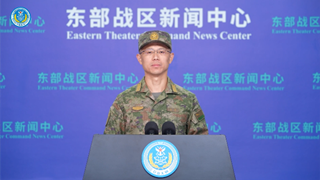By Wang Xu
王旭
Japan issued the Fourth Basic Plan on Ocean Policy at the end of April. As the general outline of the national ocean policy, it should have promoted marine development as its purpose, but listed "the promotion of Comprehensive Maritime Security by the whole government" as its top priority instead. Japan advocated that China's enhanced military strength has broken the balance of power in the Indo-Pacific region and exaggerated that "Japan's national interests are under greater threat than ever before" because of "intrusions by Chinese coast guard vessels into Japanese territorial waters, and joint naval exercises by Beijing and Moscow."
日本今年4月底出台了第四期《海洋基本计划》。作为国家海洋战略的总纲领,它本应以促进海洋发展为宗旨,却将“全政府推进综合海洋安全保障”列为首要任务。日本鼓吹“中国增强军事实力打破了印太力量平衡”,以“中国入侵领海”“中俄海上联演”来渲染“日本国家利益正面临着前所未有的威胁”。
Japan's national maritime strategy exaggerated security anxiety and focused on containing China, which reminds people of Japan's performance of exaggerating the "Chinese maritime threat" on the international stage. At the G7 Ise-Shima Summit in 2016, Shinzo Abe described "China's expansion in the East China Sea and South China Sea" to leaders at the summit. He later wrote this in his memoir and took pride in his efforts to build a "maritime order against China". His past of constantly instilling the "Chinese maritime threat" to then US President Barack Obama was also included in his memoir. Since Fumio Kishida took office, he has gone further and further on the road of pro-US and alienating China. At this year's G7 Hiroshima summit, Fumio Kishida not only talked about the East China Sea and South China Sea issues, but also encouraged the G7 to adopt a joint statement that brutally interferes in the Taiwan question.
日本国家海洋战略大肆渲染安全焦虑,聚焦遏制中国。它是对2022年底修改的三份国家安全战略文件的注脚,也让人不禁想起日本在国际舞台上极力渲染“中国海上威胁”的表演。以G7为例,2016年G7伊势志摩峰会上,安倍晋三卖力地向与会领导人描述“中国在东海、南海扩张”。安倍特将此写进回忆录,以努力构建“排华海上秩序”为荣。同样写进回忆录的,还有他不断向时任美国总统奥巴马灌输“中国海上威胁论”的过往。无独有偶,岸田文雄上台后在亲美疏华的道路上越走越远,今年的G7广岛峰会上,他不仅老生常谈东海南海问题,还鼓动G7通过粗暴干涉台湾问题的联合声明。
Japan has been spreading the "Chinese maritime threat theory" non-stop everywhere, being the instigator behind the tensions in the East China Sea, South China Sea, and Taiwan Strait. Japan has been weaving a web of lies through concept substitution, aiming to break the "peace constitution," subvert the post-war international order, and pursue the dream of becoming a "major political power" and containing China through the sea.
日本像复读机一样四处散播“中国海上威胁论”,是策动东海、南海、台海联动的始作俑者。它持续通过偷换概念来编织谎言网,做着突破“和平宪法”、颠覆战后国际秩序、谋求“政治大国化”和“以海遏华”的美梦。
Japan has been exaggerating the "threat" to the Diaoyu Islands, which in essence aimed to use the territorial dispute as an excuse to strengthen its military presence in the southwest direction. The Diaoyu Islands and its affiliated islands have been an inherent part of China's territory since ancient times. However, the Japanese side not only blatantly took illegal actions such as the so-called "nationalization" of the islands but also made false claims that it was facing a "security threat from China" in the East China Sea to create excuses for enhancing its "counterattack capabilities". Since Abe's second term, Japan has consistently increased its military and coast guard budgets, deployed troops, and missiles in Okinawa, strengthened its naval and coast guard presence in the East China Sea, and conducted exercises in the southwest direction with characteristics of high frequency, high intensity, actual combat, and internationalization.
渲染钓鱼岛“受威胁”,实质是以争端为借口强化西南方向军备。钓鱼岛及其附属岛屿自古以来就是中国的固有领土,然而日方不仅公然对钓鱼岛采取所谓“国有化”等非法行动,还将其包装成“东海面临来自中国的安全威胁”,为自身发展“反击能力”制造借口。从安倍二次执政开始,日本连年增加军费和海保预算,在冲绳陈兵布阵、列装导弹,在东海强化海军、海警的海空存在,在西南方向的演习呈现高频、高烈度、实战化、国际化等特点。
Japan's feigned victim stance is also a means to court the countries along the South China Sea, promote coordination between the East China Sea and the South China Sea, and seek opportunities for its military expansion. As a defeated country in World War II, Japan has been constrained by the post-war system in terms of security cooperation. Despite being a non-littoral state in the South China Sea, Japan frequently involved itself in the South China Sea issue as a so-called victim. Japan has taken the lead in providing patrol aircraft, vessels, radar systems, and maritime security personnel training to the countries along the South China Sea. Recently, Japan has even launched the Official Security Assistance (OSA), which is a dedicated mechanism for providing military assistance to foreign countries.
佯装“受害者”也是日本拉拢南海沿岸国,鼓吹东海、南海联动,伺机寻求“军力出海”的手段之一。作为二战战败国,日本在安全合作上受制于战后体制。它明明是南海域外国家,却以“同为受害者的身份”频频介入南海问题,率先向南海沿岸国提供巡逻机、巡逻船、雷达、海洋安全人才培训援助等,近期又抛出“政府安全保障能力强化支援”计划,即专门的对外军援机制。
China is committed to stabilizing the maritime situation, managing disputes, and providing international public goods. On the other hand, Japan's aspirations to create chaos, plot discord, and instigate trouble do not align with the development needs of the region or the desires of the regional countries. With Tokyo's frequent connections to alliances such as the US-Japan alliance, the QUAD organization, NATO, and the Global South this year, its intention to contain China has become more evident.
中国致力于稳定海上局势,管控争议,提供国际公共产品,而日本盼乱、谋乱、造乱既不契合区域发展需求,也不符合地区国家愿望。美日同盟、“四方安全对话”、北约、“全球南方”等等,今年以来东京频频与它们联系在一起,执意遏华的心思昭然若揭。
(The author is deputy director of the Institute of Maritime Strategy Studies, China Institutes of Contemporary International Relations)
(作者是中国现代国际关系研究院海洋战略研究所副所长)
Editor's note: Originally published on huanqiu.com, this article is translated from Chinese into English and edited by the China Military Online. The information and opinions in this article do not necessarily reflect the views of eng.chinamil.com.cn.









